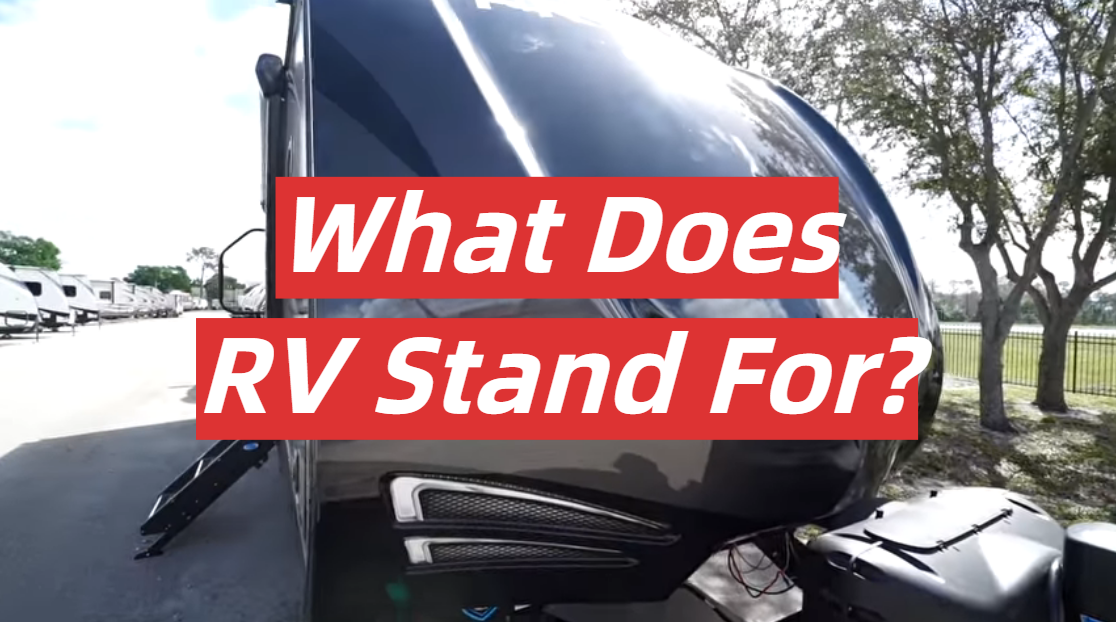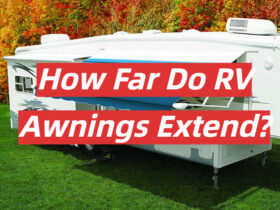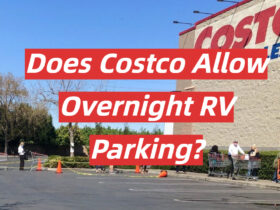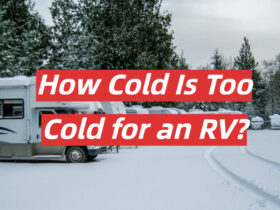Table of Contents
What Does “RV” Stand For?
RV stands for a recreational vehicle. It is also known as an RV, motorhome, or campervan. The term “recreational vehicle” was coined in the 1960s to describe this type of car that worked like a home on wheels – a way to bring all your comforts and conveniences with you while traveling down the road.
They are vehicles with a living area and often include cooking appliances, sleeping space, a bathroom, and even a shower in some cases. Today, RVs come in many different shapes and sizes but they are usually self-propelled vehicles built for movement over long distances by roads rather than water or air transport.
The RV Lifestyle
Anyone can enjoy a lifestyle, regardless of age or gender. An RV gives you the freedom to explore the country and choose where you want to settle down at any time. People who live in their RV full-time are called “full-time RVers”. However, many people enjoy living an extended vacation or weekend getaway lifestyle known as “part-time RVing”.
This type of lifestyle is a great choice for anyone who wants to see the country on their terms. It gives you the freedom and flexibility that no other life can offer.
Types of RVs
Class A Motorhomes
- The largest of these RVs start around 45 feet long although there are many larger models available too;
- They have a living room in front with a sofa, chairs and even a fireplace for those who want to make their motorhome feel more like home. There is also typically an entertainment system installed which can include either satellite or cable television;
- This type of RV has a separate bedroom as well as living area;
- The driver’s seat sits above the engine compartment. The engine generates heat so you can use the motorhome in cold weather without issues;
- The design of a Class A motorhome makes it the easiest to drive;
- There’s a large turning radius and smaller size;
- They’re the most expensive type of RV to buy and maintain, they require diesel fuel instead of gas;
Class B Motorhomes
- This type of RV is smaller than a Class A and has no separate bedroom. However, there are convertible beds that can be used for sleeping during travel or while camping in an overnight spot;
- The driver’s seat sits above the engine compartment just like with a Class A, but unlike the larger model, this one does not have the heat generated from under the hood so you can’t use it in cold weather without issues;
- It also provides less storage space than other models which means more packing when taking trips;
- The design of a Class B motorhome makes it difficult to drive, especially in comparison with the other types on this list that are all very easy to operate;
However, these vehicles do have their own set of perks as well such as being able to park them almost anywhere and they make for great second homes even though they tend to be smaller than others that fall into the category of RVs from start finish.
Class C Motorhomes
- Class C motorhomes are the smallest and most affordable type of RV;
- They often have a kitchenette, which means you will be able to cook some meals without having to go out for food constantly. But it also can mean less space inside your vehicle since space is taken up by appliances like the stove and sink;
- The good thing about many class C motor homes is that they come with beds already built into them, so you won’t need to buy expensive furniture or sleep on an air mattress. Sometimes have pop-out beds on top of the seating which makes them feel bigger inside when not being used but can be folded away easily if you want all your seats back again;
- These vehicles typically do not fit in regular parking spots (since they’re usually longer than standard-sized cars). Class C motorhomes are typically longer than 24 feet, but not usually more than 40;
- They have larger baths and showers with more storage space for clothes/linens, etc.;
- The living room is usually at the entrance of the vehicle so it’s a great place to watch TV or family games in bad weather;
Travel Trailers
- These RVs have beds inside the trailer only which makes them ideal for those who want to camp at places where they can’t be plugged into an outlet overnight and spend their time outdoors instead while traveling from one location to another;
- They also come with stovetops so you can cook your own meals;
- Travel trailers are also some of the easiest types to tow which is why they are so popular among those who want an RV but can’t afford one that makes it difficult for them to maneuver through traffic or have their vehicle towed by anyone else;
- The downside to these RVs is there is limited storage space inside and out;
Fifth Wheel Campers
- Fifth wheel campers are motorhomes that resemble travel trailers in size and shape but with one major difference. They use a hitch instead of being connected to the back of your vehicle since they have an extended bed on top that resembles a bunkhouse all its own where people can sleep comfortably at night without having to worry about running out of space inside or outside their RV when camping during overnight stops;
- This RV type has limited storage space;
- However, RVs equipped with everything necessary including kitchens built into the walls, living areas that can be converted into bedrooms for privacy reasons;
- Fifth wheel campers also come with decks outside that allow you to bring your pets along as long as they do not weigh too much;
Pop-up Campers
- They only offer enough room for one or two people inside plus whatever else is necessary during travel;
- Pop up campers come with small kitchens that are usually attached to the back of these RVs which provide extra storage space for food and other kitchen appliances;
- Most pop-up campers do not have bathrooms installed;
- Pop up campers are not as expensive as fifth-wheel RVs but do come with their own set of rules that must be followed whenever they are being towed to a campsite especially if you want more privacy than sleeping in your car;
Truck Campers
- Truck campers are the most expensive type of recreational vehicle because they can be installed onto trucks without needing any additional equipment or supplies;
- They usually come with their own kitchen area where you can store food items;
- Truck campers also include living space where entire families can sleep comfortably when traveling away from home;
- These trucks usually come with solar panels attached to the outside so it does not rely completely on gas stations for refueling;
- Truck campers can sometimes weigh upwards of several thousand pounds meaning that they might damage your truck’s engine over time unless installed properly which is why some people avoid using them as a type of RV;
Toy Haulers
- Toy haulers are not expensive recreational vehicles but might come with a few extra features that make it hard for you to install them onto the back of your truck if they do not already have locking doors present. Toy haulers usually cost less than truck campers, because they do not require trucks pulling them around;
- The inside comes equipped with bathrooms where everyone can shower;
- Their kitchens usually include all modern such as microwaves, ovens, refrigerators, sinks, and cooking areas where everyone can cook on-site;
- These RVs also include living spaces for the entire family;
- They are lighter than most other types of recreational vehicles which means that you will be able to install them onto your car faster even if it takes a few hours before completing this process successfully especially if you have never done so before during any previous camping trips;
Toy haulers usually cost less than truck campers, because they do not require trucks pulling them around but still come with bathrooms, kitchens, and storage areas for extra supplies like water jugs or anything else required in order to make it through the next day of traveling without stopping at motels along the way.
Favorite RVing Destinations
RVing is a great way to explore beautiful places. Some of the most popular camping destinations for RVers are:
- Pismo Beach, CA (central coast);
- Lake Havasu City, AZ (desert spots along Colorado River);
- Palm Springs Area, CA (desert spot near LA);
Fun Things to Bring and Do While Camping
- Bring your favorite books, board games, and cards. Also, bring along comforts like pillows for naps in the shade;
- Hike or walk around to take photos of wildflowers or wildlife that you might find! You never know what you’ll discover outdoors;
- Tell stories to your family around the fire;
- Taking trips out into nature where they sleep in tents underneath the sky full of twinkling lights at night;
Caring For Your RV While Camping
- Keep your RV clean! Sweep and mop the floors, take out the trash regularly;
- Check all of your water lines to make sure that they aren’t leaking or broken. If you see any issues, fix them immediately;
- Make sure all lights work before heading on a trip in order to avoid electrical problems later down the road. If something does go wrong with one of the bulbs while traveling, pull over as soon as possible so that no accidents happen during driving at night time when it’s harder to notice the damage done by faulty light switches or outlets;
- If it’s raining while you’re away, check the roof for any leaks when coming back;
Caring for your RV requires checking all parts regularly so that no issues happen during trips out into wilderness areas where there are other campers around who might not want to get involved with helping fix problems associated with faulty electrical wiring or water lines leaking from roofs under heavy rain conditions.
If something does go wrong while on the road, however, pull over as soon as possible in order to avoid any dangerous accidents when it’s harder to notice electrical problems with lights or outlets not turning on.
Check more guides to improve your RV experience:
FAQ
What is the RV abbreviated for?
RV stands for “Recreational Vehicle”. The term RV is used to refer to a vehicle that people can live in or drive around on the road, such as a camper van. People often use an RV during their travel and vacations so they don’t have to worry about paying expensive hotel fees each time they stay overnight at another place.
What does RV mean in slang?
A generous acronym for Recreational Vehicle, an R.V. is a vehicle used to make temporary stops on the road during a long journey or stay at home without having to set up a fixed residence somewhere. It can be anything from a small trailer for 2 people all the way up to homes with multiple bedrooms and bathrooms that are made of steel instead of wood.
Other common acronyms include:
- Tender – Boat Driver (a tender is typically smaller than its mother ship)
- NCCA – National Camping Community Association (an organization dedicated to supporting camping events);
- KOH – King of the Hammers (a type of off-road racing competition);
What is the difference between a camper and an RV?
Camper vans are self-contained and can accommodate larger groups of people. They offer a lot more space than an RV, but they aren’t as comfortable because there aren’t any bathroom or kitchen facilities provided in the vehicle itself. RVs have everything you need for cooking and sleeping inside them – many even come with a television!
Do you need a special license for an RV?
No, an RV is a recreational vehicle and you do not need a special license to drive them. According to current DMV laws in all 50 states, you are qualified to drive any vehicle under 26,000 pounds with a regular operator’s driver’s license.
Can you live permanently in an RV?
RVs are often the choice of people who want to travel and live in their RV while they’re on vacation. On average, most RVs aren’t designed for this type of lifestyle over a long period of time. You can use an RV as your primary residence if it is large enough or you plan to stay put at one location for years instead of months. An RV is also advantageous because there are no property taxes associated with owning them!
When choosing where to park your home, make sure you have access to water hookups. If that isn’t possible then be prepared with some great amenities like solar panels! Another important consideration when living in an RV full-time is finding a place that allows overnight stays. The biggest problem with this lifestyle is finding a place to park the RV each night.
Can you walk around an RV while driving?
An RV must remain in the lane of traffic at all times. You can walk around, but you can’t leave the vehicle.
Can you park a Class B RV anywhere?
Most RVs are able to be parked in any parking lot or designated area where regular cars can park, but there may be regulations about this depending on your local laws so it’s best to check with them first before doing anything like sleeping overnight at a Walmart parking lot!
With a small inconspicuous Class B RV, you can usually park on the street, just like you would with any other van. A large motorhome or a lengthy towed rig is more likely to stick out and attract undesirable attention when compared to a tiny Class B RV.
What is RV boondocking?
RV boondocking is when you go on a camping trip in an RV and avoid established campsites. Boondocking is also sometimes referred to as free camping or dispersed camping. The challenge of boondocking comes in finding a place to park your RV for the night that does not require payment and has access to amenities like water, power, bathrooms (and trash removal).
There are websites out there dedicated specifically to help you find good places to camp with an RV without having to pay each time. However, it can be difficult at times because these sites do not cover every single spot where you can stay overnight.
Is it smart to buy an RV?
These vehicles, also known as motor homes or trailers, are used by individuals who love to travel and spend time outdoors. Whether you’re interested in long road trips across the country or a weekend getaway into nature, buying an RV is a great way to explore America while still having access to all of your necessities. Many people purchase RVs with intentions of using them full-time but others only use them on weekends or vacations every so often.
What about renting a camper, trailer, or motorhome?
It certainly can be an option if you are willing to sacrifice some of the comforts of home. It’s also a great way for families or large groups on vacation, or individuals who want to save money by cooking their own meals and doing laundry while they travel.
How much is a used RV?
Used RVs tend to range between $15K-$40K depending on their year/make/model.
If you’re looking to purchase an RV, the price of a used one will vary depending on its age and condition. If you need help determining how much money to spend on such an investment, it’s best to speak with someone who specializes in RVs. They can give you up-to-date information about what types of vehicles cost and which ones are worth purchasing based on their conditions. Keep in mind that you should also factor in the cost of any repairs or replacements needed for your vehicle.






Leave a Reply